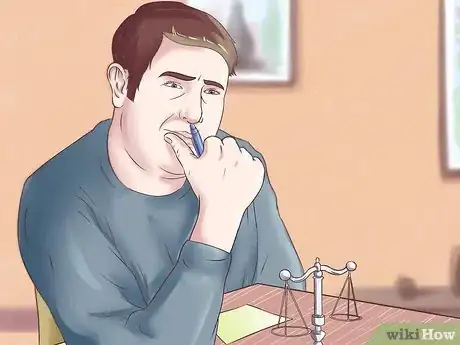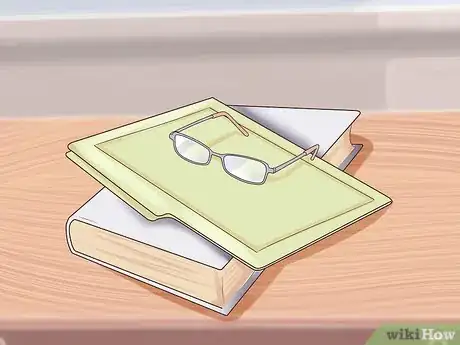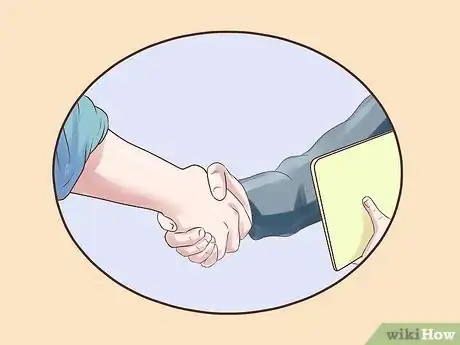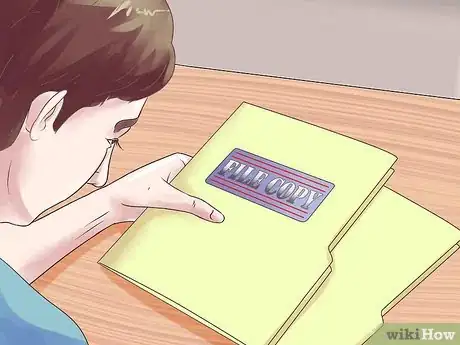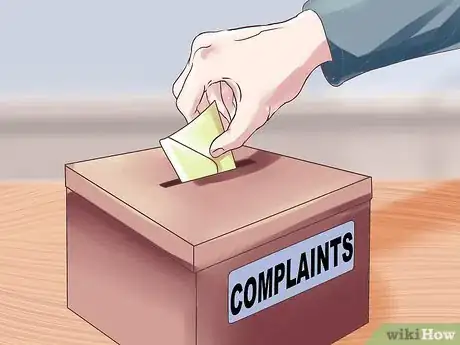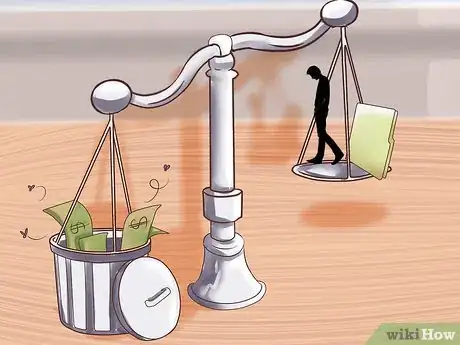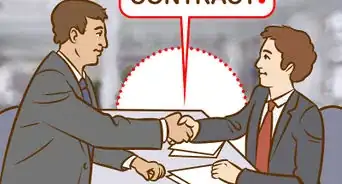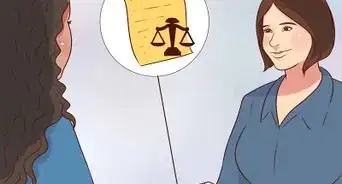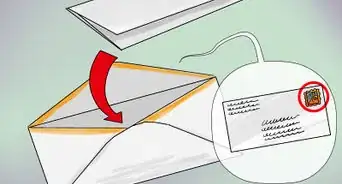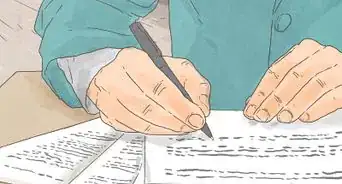This article was co-authored by Camila Lopez. Camila Lopez is an Attorney and is the CEO & Co-Founder of People Clerk. Her passion is breaking down complicated legal processes so that people without an attorney can get justice, and she co-founded People Clerk to help individuals navigate the court system in an easy and affordable way. As the Chief Legal Architect at People Clerk, she has designed the People Clerk platform so that individuals can learn how to pursue their small claims lawsuits on their own. As a trained mediator, she is also passionate about the out-of-court resolution of disputes. Prior to People Clerk, she worked in plaintiff’s mass torts litigation and in consumer protection at the New York Attorney General's Bureau of Consumer Frauds and Protection. She received a Bachelor of Arts in Political Economy from the University of California, Berkeley, and attended Benjamin N. Cardozo School of Law in New York City, where she received the Mark Whitlock Scholarship for her effort, energy, spirit, and initiative that strengthened student life.
wikiHow marks an article as reader-approved once it receives enough positive feedback. In this case, 100% of readers who voted found the article helpful, earning it our reader-approved status.
This article has been viewed 198,187 times.
The relationship between an attorney and client is intended to be professional and, ultimately, beneficial to both parties. You always have the right to fire an attorney, especially if you feel he or she isn’t acting in your best interest. However, before you do, you should carefully consider the costs and time you’ll need to spend on finding another attorney. To learn more about how to make the decision to switch attorneys and fire the one you have, see Step 1.
Steps
Deciding to Fire an Attorney
-
1Give the decision careful thought. A client is always allowed to fire an attorney at will, but it's not a decision that should be made lightly. Even if you don't like your attorney or don't think they're doing an excellent job, it might be worth having them finish work that's currently in progress, since firing them could be disruptive and detrimental to your case. When you're making this decision, be sure that firing your attorney will actually give you the results you want in the long run.
- If your attorney has already spent a lot of time on your case, it's going to be difficult for another attorney to pick up where he or she left off. It might be hard to find a new attorney who's interested in taking on your case. This is especially true if the case comes with a big lien attached. Unless the new attorney stands to win a lot of money, he or she won't have much incentive to take you on as a client.
- Other attorneys may also be reluctant to take your case if they see you as a "problem client." This won't be an issue if you have a great reason to fire your attorney, like if he or she has completely dropped the ball, but firing someone because you simply don't like their personality could make it difficult to find another attorney willing to take you on as a client.
- Another thing to keep in mind is that depending on your case and the agreement you have with your attorney, you may still end up having to pay an expensive attorney's fee. The longer your attorney has been working on your case, the more you'll probably have to pay. If you hire a new attorney, you'll have new fees to pay as well. So switching attorneys mid-case can be quite expensive. However, if you have a good shot at winning, it might be worth it.
- If the work has already been done, you're not going to get your retainer back. You're only going to get unused portions of your retainer back.
-
2Assess your reasons for wanting to change attorneys. Even though firing an attorney can complicate things, sometimes it's the best decision to make. If you don't think your attorney is handling your case with competence, it's important to find someone with whom you feel more comfortable. Firing your attorney might be the best way forward if any of the following circumstances apply to your situation:
- Your attorney has been dishonest with you. If you have reason to believe your attorney has stolen from you or been otherwise grossly incompetent, you need to fire your attorney.
- Your attorney has stopped communicating with you. This situation can commonly be remedied, but if your attorney simply stops responding to calls and emails, you'll need to find other representation.[1]
- You're concerned that your attorney isn't doing a good job. It might be difficult to tell whether your attorney is doing competent work on your case. Before firing your attorney, it's worth investigating a bit to see if the work they're doing seems legitimate. If it doesn't, you'll need to pull the plug.
- You really dislike your attorney's personality. Firing your attorney over a personality conflict isn't ideal, so it's best to do what you can to make it work. You don't necessarily have to like your attorney - especially if he or she is doing a fine job on your case. But if you simply can't work with the person and you don't want them in your life anymore, it's better to start working with someone you can trust.
Advertisement -
3Get a second opinion. If you're not sure whether firing your attorney is the right thing to do, get the opinion of another attorney or someone who's knowledgeable about legal matters. Conduct research to find out if your attorney has been handling your case with professionalism. If it turns out that your attorney doesn't seem to adequately understand your case, and his or her decisions have been detrimental instead of helpful, you should fire your attorney.[2]
- Hiring an attorney to get a second opinion usually isn't that expensive, since it only requires a few hours of the second attorney's time. It might be well worth the expense to help you decide whether you need to fire your attorney.
- If you don't want to go to the trouble of hiring a second attorney, consider doing your own legal research. Go to the local law library and get more familiar with the ins and outs of your case. If you have a better understanding of your legal situation, you'll be equipped to make an informed decision about whether your attorney is doing a good job.[3]
-
4Express your concerns to your attorney. It's in your attorney's best interest to make you happy and ultimately win your case, so before you decide to fire your attorney, try talking things out instead. Schedule an in-person meeting or a phone call and express the concerns you have about the way things are going. Alternatively, you could write a formal letter stating specific concerns and laying out the changes you want to see. You might find that you don't have to take such drastic measures after all.
- If your attorney has been uncommunicative, or hasn't been spending an adequate amount of time on your case, this gives him or her the chance to rise to the occasion. In an ideal situation you wouldn't have had to pressure your attorney to improve, but this outcome is still ultimately less disruptive than having to fire your attorney.
- Have you explored other options for conflict resolution before taking the step of firing your attorney? Consider contacting your state’s bar association to request arbitration for disputes between you and your attorney.
- If you still aren't satisfied after bringing up your concerns, you can fire the attorney.
Firing an Attorney
-
1Read the agreement you and your attorney signed. Carefully read through any fee for services agreements or other contracts you may have signed with your attorney. Make sure you understand what fees you may be obligated to pay and what steps you may have agreed to follow in order to terminate your attorney-client relationship.
- Most agreements detail a series of steps that should be taken in order to end the relationship. In addition to paying the agreed-upon fee you'll need to formally notify your attorney that the relationship is being terminated.
-
2Hire a new attorney. Before you officially fire your old attorney, it's a good idea to hire a new one - especially if your case is still in progress. The new attorney will need time to catch up in order to ensure a smooth transition.[4] Having lag time without an attorney working on your case could be detrimental.
- Hiring a new lawyer before officially firing the old one will also be helpful if you're not sure how to handle the termination. Your new attorney can help you wrap things up in a professional way. This is especially important if you end up wanting to sue the old attorney for malpractice.[5]
-
3Inform your attorney that you're terminating him or her. Do this according to the steps outlined in your agreement with your attorney. If your agreement doesn't outline a process for terminating the relationship, send a certified or registered letter to the attorney's place of business, stating that you are terminating the professional relationship and that he or she should immediately cease working on any and all matters related to your case.
- If you prefer, you can fire your attorney over the phone or in a face-to-face conversation instead. However, it's better to have it on paper to make the termination official.
- There's no need to state reasons why you're firing your attorney, unless you feel compelled to do so.[6]
- If applicable, request a refund of any fees paid in advance for which the work has not yet been done. Also request an itemized billing of charges made, and review this for any discrepancies.
-
4Get a copy of your files. You have the right to a copy of your case files. Request your files in the termination letter, specifying where they should be sent. Set a deadline for the transfer. If you feel more comfortable picking up the files in person, state the date and time you'll be coming to get them.
- You can also request that all your files be transferred to your new attorney, and set a deadline by which the transfer should be completed.
- It is illegal for the attorney to try to withhold your files or pay a fee to get a copy.
Taking Action Against an Attorney
-
1Consider filing a complaint. If your attorney mishandled your case, completely stopped communicating with you or made a serious mistake, you might want to file a complaint with the entity that oversees the practice of law in your state.[7] Filing a complaint will start a process in which the attorney's work is reviewed by a disciplinary board. If the complaint is found to be valid, the attorney may have to appear at a hearing. Depending on the nature of the complaint, the attorney may end up with a fine or even a revoked attorney's license.[8]
- The process for filing a complaint differs by state. Contact your state's bar association or disciplinary board to find out more about the process you need to take.
- If your aim is to receive damages you believe you're owed as result of your attorney's mishandling of your case, you should sue for malpractice instead of filing a complaint.
-
2Consider suing for malpractice. In order to sue for malpractice, you have to be able to prove that 1. Your attorney made a mistake, and 2. If your attorney hadn't made the mistake, you would have won your case.[9] Even if it's clear that your attorney messed up, you won't have a case unless you can show that it directly affected the outcome of your case and resulted in your losing money.
- If you want to sue for malpractice, make sure you have a new, trustworthy attorney to help you navigate the process.
- Be sure to start the lawsuit as soon as possible, since a common argument made by attorneys who are being sued for malpractice is that the client waited too long to start the lawsuit.[10]
Expert Interview
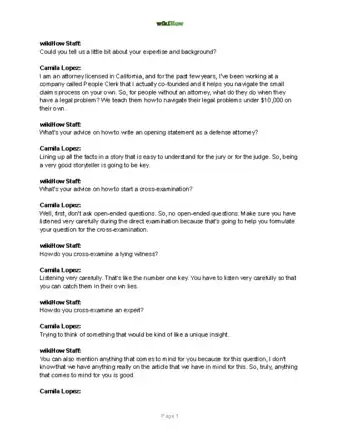
Thanks for reading our article! If you’d like to learn more about small claims, check out our in-depth interview with Camila Lopez.
References
- ↑ http://www.nolo.com/legal-encyclopedia/problems-with-lawyer-tips-strategies-29925.html
- ↑ https://www.lawyers.com/legal-info/research/how-to-fire-your-attorney.html
- ↑ http://www.nolo.com/legal-encyclopedia/problems-with-lawyer-tips-strategies-29925.html
- ↑ http://www.nolo.com/legal-encyclopedia/problems-with-lawyer-tips-strategies-29925.html
- ↑ http://www.nolo.com/legal-encyclopedia/problems-with-lawyer-tips-strategies-29925.html
- ↑ https://www.lawyers.com/legal-info/research/how-to-fire-your-attorney.html
- ↑ http://hirealawyer.findlaw.com/choosing-the-right-lawyer/where-can-i-file-a-complaint-against-my-lawyer.html
- ↑ http://hirealawyer.findlaw.com/choosing-the-right-lawyer/where-can-i-file-a-complaint-against-my-lawyer.html
- ↑ http://www.nolo.com/legal-encyclopedia/problems-with-lawyer-tips-strategies-29925.html
Community Q&A
-
QuestionI have a friend who is currently incarcerated. His wife hired his attorney. She wants to fire the attorney but my friend wishes to keep him. Does his wife have the right to do this?
 Community AnswerThe attorney-client relationship only exists between the attorney and client - not between the attorney and the client's wife. It doesn't matter who hired the attorney or even who pays the attorney. Only the client can fire the attorney.
Community AnswerThe attorney-client relationship only exists between the attorney and client - not between the attorney and the client's wife. It doesn't matter who hired the attorney or even who pays the attorney. Only the client can fire the attorney. -
QuestionWhat should I do if I want to settle my case but my attorney will not do as I have asked him to do?
 Community AnswerYou should fire him but be aware, you will still have to pay him for his time.
Community AnswerYou should fire him but be aware, you will still have to pay him for his time. -
QuestionCan I be my own attorney if they will not do as I requested?
 Community AnswerYou can represent for yourself in place on an attorney, if you are capable to do so.
Community AnswerYou can represent for yourself in place on an attorney, if you are capable to do so.
About This Article
Before you fire an attorney, make sure to read over the contract you’ve signed with them, which will detail the steps you need to take. As a general rule, you’ll need to formally notify your attorney of the termination and pay the agreed upon fees in order to terminate the contract. Although you’re not required to fire them in writing, you may want to have a paper record, especially if you’re asking for a refund on any fees you paid in advance. You should also try to hire a new attorney before firing the old one to ensure a smooth transition. For more advice from our Legal co-author, including how to file a complaint against your attorney, keep reading.
